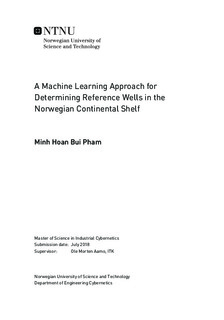| dc.description.abstract | An unsupervised learning solution for selecting relevant reference wells for a new well that is to be drilled in the Norwegian Continental Shelf (NCS), shall be made with readily available software tools such as Python and the machine learning library Scikit-Learn. The developed expert system shall select the most relevant wells based on a simple feature of the well; its geological profile. Clustering analysis, such as the k-means algorithm and Voronoi partition, will serve to increase the convergence towards the solution, proposed by the system, by pinpointing which clusters of wells are most relevant in the total database of wells. The final solution by the system is then achieved by studying these selected clusters with simple statistics and by exploiting the greedy property of the nearest neighbor rule.
The foundation of the expert system is based on a small test set consisting of 16 wells from two different fields. Eight from the Ivar Aasen field and eight from the Valhall field. Simple and clear assumptions are made on this test set in order to program a scalable prototype of the expert system. The prototype is tested on a large available database of well data taken from the Norwegian Petroleum Directorate (NPD), together with a well, \textit{Well X}, from a collaborative firm where the selected reference wells are already known. The results gained from both cases were good. When running the test set, the system was able to distinguish between the Ivar Aasen field and the Valhall field. When running \textit{Well X} through the system, it was able to select the eight original wells that were actually picked in the real operation.
Though further work is necessary to achieve an optimal system, the proposed final solution in this thesis leaves a good first impression, and should motivate the average engineer in the industry to develop small scale solutions to optimize daily work processes. | en |

